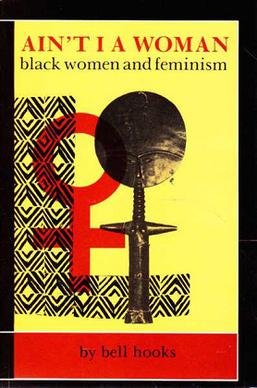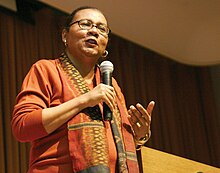
Ain't I a Woman? Black Women and Feminism is a 1981 book by bell hooks titled after Sojourner Truth's "Ain't I a Woman?" speech. hooks examines the effect of racism and sexism on Black women, the civil rights movement, and feminist movements from suffrage to the 1970s. She argues that the convergence of sexism and racism during slavery contributed to Black women having the lowest status and worst conditions of any group in American society. White female abolitionists and suffragists were often more comfortable with Black male abolitionists such as Frederick Douglass, while southern segregationalists and stereotypes of Black female promiscuity and immorality caused protests whenever Black women spoke. hooks points out that these white female reformers were more concerned with white morality than the conditions these morals caused Black Americans.

Misogyny is hatred of, contempt for, or prejudice against women or girls. It is a form of sexism that can keep women at a lower social status than men, thus maintaining the social roles of patriarchy. Misogyny has been widely practised for thousands of years. It is reflected in art, literature, human societal structure, historical events, mythology, philosophy, and religion worldwide.
Misandry is the hatred of, contempt for, or prejudice against men or boys.
Radical feminism is a perspective within feminism that calls for a radical re-ordering of society in which male supremacy is eliminated in all social and economic contexts, while recognizing that women's experiences are also affected by other social divisions such as in race, class, and sexual orientation. The ideology and movement emerged in the 1960s.
Dominator culture refers to a model of society where fear and force maintain rigid understandings of power and superiority within a hierarchical structure. Futurist and writer Riane Eisler first popularized this term in her book The Chalice and the Blade. In it, Eisler positions the dominator model in contrast to the partnership model, a more egalitarian structure of society founded on mutual respect among its inhabitants. In dominator culture, men rule over women, whereas partnership culture values men and women equally.
Pro-feminism refers to support of the cause of feminism without implying that the supporter is a member of the feminist movement. The term is most often used in reference to men who actively support feminism and its efforts to bring about the political, economic, cultural, personal, and social equality of women with men. A number of pro-feminist men are involved in political activism, most often in the areas of gender equality, women's rights, and ending violence against women.
The men's movement is a social movement that emerged in the 1960s and 1970s, primarily in Western countries, which consists of groups and organizations of men and their allies who focus on gender issues and whose activities range from self-help and support to lobbying and activism.
The men's liberation movement is a social movement critical of the restraints which society imposes on men. Men's liberation activists are generally sympathetic to feminist standpoints.

Black Sexual Politics: African Americans, Gender and the New Racism by Patricia Hill Collins is a work of critical theory that discusses the way that race, class and gender intersect to affect the lives of African American men and women in many different ways, but with similar results. The book explores the way that new forms of racism can work to oppress black people, while filling them with messages of liberation.
Since the 19th century, men have taken part in significant cultural and political responses to feminism within each "wave" of the movement. This includes seeking to establish equal opportunities for women in a range of social relations, generally done through a "strategic leveraging" of male privilege. Feminist men have also argued alongside writers like bell hooks, however, that men's liberation from the socio-cultural constraints of sexism and gender roles is a necessary part of feminist activism and scholarship.
Christianity and domestic violence deals with the debate in Christian communities about the recognition and response to domestic violence, which is complicated by a culture of silence and acceptance among abuse victims. There are some Bible verses that abusers use to justify discipline of their wives.
Patriarchy is a social system in which positions of dominance and privilege are held by men. The term patriarchy is used both in anthropology to describe a family or clan controlled by the father or eldest male or group of males, and in feminist theory to describe a broader social structure in which men as a group dominate women and children.

The representation of gender in horror films, particularly depictions of women, has been the subject of critical commentary.

Compulsory heterosexuality, often shortened to comphet, is the theory that heterosexuality is assumed and enforced upon people by a patriarchal and heteronormative society. The term was popularized by Adrienne Rich in her 1980 essay titled "Compulsory Heterosexuality and Lesbian Existence". According to Rich, social science and literature perpetuate the societal belief that women in every culture are believed to have an innate preference for romantic and sexual relationships with men. She argues that women's sexuality towards men is not always natural but is societally ingrained and scripted into women. Comphet creates the belief that society is overwhelmingly heterosexual and delegitimizes queer identities. As a result, it perpetuates homophobia and legal inequity for the LGBTQ+ community.
Hip hop feminism is a sub-set of black feminism that centers on intersectional subject positions involving race and gender in a way that acknowledges the contradictions in being a black feminist, such as black women's enjoyment in hip hop music and culture, rather than simply focusing on the victimization of black women in hip hop culture due to interlocking systems of oppressions involving race, class, and gender.
Feminist art criticism emerged in the 1970s from the wider feminist movement as the critical examination of both visual representations of women in art and art produced by women. It continues to be a major field of art criticism.

In feminist theory, the male gaze is the act of depicting women and the world in the visual arts and in literature from a masculine, heterosexual perspective that presents and represents women as sexual objects for the pleasure of the heterosexual male viewer. In the visual and aesthetic presentations of narrative cinema, the male gaze has three perspectives: that of the man behind the camera, that of the male characters within the film's cinematic representations; and that of the spectator gazing at the image.
The concept of toxic masculinity is used in academic and media discussions to refer to those aspects of hegemonic masculinity that are socially destructive, such as misogyny, homophobia, and violent domination. These traits are considered "toxic" due in part to their promotion of violence, including sexual assault and domestic violence. Socialization of boys sometimes also normalizes violence, such as in the saying "boys will be boys" about bullying and aggression.

Esmaa Mohamoud, also known as "E," is an African-Canadian sculptor and installation artist who grew up in London, Ontario, and currently practices in Toronto, Ontario. Her work has been shown at the Royal Ontario Museum, McGill University, The Art Gallery of Ontario, YYZ Artist Outlet, The Drake Devonshire Gallery, Art Lab Gallery at Western University, Georgia Scherman Projects, amongst others.
Colonial sexual violence in North America refers to the systems put in place by Europeans through settler colonialism that enforces gender divides, support sexual exploitation, and use patriarchy as a means to control the Indigenous population. These systems not only affected men, women, and two-spirit people differently, but disrupted traditional ways of living in a negative manner which thus removed their identity. As settler colonialism is an ongoing effort, these systems have remained in place and continue to perpetrate harm today as seen through generational trauma related to the residential school system, MMIW, and the Indian Act. Indigenous scholars emphasize the need for community healing and traditional practices to heal the collective traumas, and experiences of sexual violence, enacted through settler colonialism.








